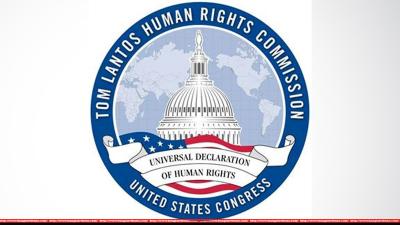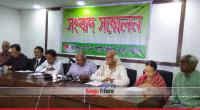 After the European Parliament, a US bipartisan congressional commission has criticized the human right situation in Bangladesh.
After the European Parliament, a US bipartisan congressional commission has criticized the human right situation in Bangladesh.
Organised by Tom Lantos Human Rights Commission, the programme titled “Elections and Human Rights in Bangladesh” was held in Washington Thursday where panellists from Human Rights Watch and World Vision participated. Former US ambassador Marica Bernicat also attended the programme but did not speak.
Asia Advocacy Director of Human Rights Watch John Sifton said there is no reason to believe that the upcoming election will be free and fair.
Sifton said the ruling party detained thousands of opposition activists before the election and made a crackdown on the media and civil society.
He said the caretaker government filed cases against Awami League chief Sheikh Hasina and BNP head Khaleda Zia, but the government dropped the case against Hasina.
South Asia Policy Analyst at the US Commission on International Religious Freedom Waris Husain said many Hindus fled the country because of reported social, economic, and political discrimination.
The religious minorities across South Asia have been subject to intimidation, threats, and physical violence in the lead up to elections, he said.
This happened in Bangladesh to some extent in 2014 when Hindu, Buddhist, and Christian homes and shops were destroyed by opposition party supporters, he added.
Senior Program Manager of World Vision US Laura Bramon said, “We have seen great progress in Bangladesh, but there is still work to be done.”
In December, Bangladesh will hold its general elections and political violence remains a grave, cyclical danger for Bangladeshi children, she said.
In election seasons and on anniversaries of controversial political events, sexual violence and firebombing1 often claim children among their victims, she added.
During the Q/A session, Bangladesh Washington mission deputy chief Mahbub Saleh gave pointed responses to certain issues raised by John Sifton and Laura Bramon.
Regarding government’s reluctance to welcoming election observers, Saleh stated that the Bangladesh government welcomes international election observers to come and observe the elections.
On the issue of detention of thousands of political activists from the opposition, he referred to the recent dialogues between the prime minister and different political parties.
The prime minister asked BNP to provide a list of people who are under detention without criminal charges and she would then look into this, Saleh said,
As regards to the issue that Khaleda Zia was jailed by the government, Saleh said that she was jailed by the court, and not by the government, after a 10-year long proceeding and added that further judicial steps are available.
As for detaining photo-journalist Shahidul Alam, Saleh said that he was arrested at his public pronouncements during the road safety movement of students had the elements of inciting violence and those also had elements of the threat to the country’s national security.
In response to the issue of forced and involuntary repatriation of Rohingyas, he said that it’s not “due to tremendous international pressure” that Bangladesh has decided not to start repatriating the Rohingyas to Myanmar.
He said that Bangladesh has decided so because of its principled position of not forcing any Rohingya to Myanmar against their will.
Bangladesh has maintained this principled position and will continue to do so, he added.
In response to John Sifton’s claim that cases filed by the caretaker government against Khaleda Zia continued but those against Sheikh Hasina were dropped, Counsellor at the Bangladesh mission Nurul Islam said that such claims by him are attempts of impugning the integrity of an independent judicial system.
 National
National
30721 hour(s) 34 minute(s) ago ;
Evening 08:28 ; Thursday ; Apr 18, 2024
US Congress commission criticises human rights situation in Bangladesh
Send
Sheikh Shahariar Zaman
Published : 20:26, Nov 16, 2018 | Updated : 16:09, Nov 17, 2018
Published : 20:26, Nov 16, 2018 | Updated : 16:09, Nov 17, 2018
0 ...0 ...
/hb/
Topics: Top StoriesExclusive
- KOICA donates medical supplies to BSMMU
- 5 more flights to take back British nationals to London
- Covid19: Rajarbagh, Mohammadpur worst affected
- Momen joins UN solidarity song over COVID-19 combat
- Covid-19: OIC to hold special meeting
- WFP begins food distribution in Cox’s Bazar
- WFP begins food distribution in Cox’s Bazar
- 290 return home to Australia
- Third charter flight for US citizens to return home
- Dhaka proposes to postpone D8 Summit
Unauthorized use of news, image, information, etc published by Bangla Tribune is punishable by copyright law. Appropriate legal steps will be taken by the management against any person or body that infringes those laws.
Bangla Tribune is one of the most revered online newspapers in Bangladesh, due to its reputation of neutral coverage and incisive analysis.
F R Tower, 8/C Panthapath, Shukrabad, Dhaka-1207 | Phone: 58151324; 58151326, Fax: 58151329 | Mob: 01730794527, 01730794528


